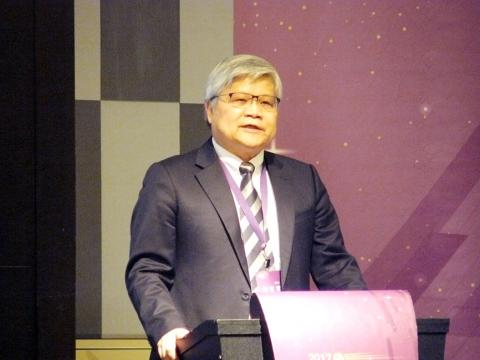Taiwan’s semiconductor industry is bracing for escalating global competition amid rising protectionism and the ascension of China, Taiwan Semiconductor Industry Association (TSIA, 台灣半導體協會) director-general C.C. Wei (魏哲家) said yesterday.
Wei made the remarks during his opening speech at the annual TSIA meeting in Hsinchu.
Wei also serves as cochief executive officer of Taiwan Semiconductor Manufacturing Co (TSMC, 台積電) and is to become the sole chief executive of the chip supplier to Apple Inc in June next year in the company’s latest succession plan.

Photo: CNA
TSIA members are being presented with enormous business opportunities primarily from the nascent adoption of artificial intelligence, which is expected to be widely applied to virtual reality and augmented reality devices, the Internet of Things and self-driving cars, Wei said.
At the same time, local semiconductor companies are facing challenges, he said.
“It is a challenge for Taiwan’s semiconductor industry [to fend off competition from China] as the Chinese government is endeavoring to foster its semiconductor industry,” Wei said. “It is undeniable that China has risen to be the world’s biggest semiconductor market, with more than a 30 percent share.”
Chinese central and local governments fully support its semiconductor companies to enhance their competitiveness and reduce the nation’s dependence on chip imports. China has an ultimate goal of bringing the nation to the center of the worldwide semiconductor industry by 2025.
To address the issue, Taiwanese semiconductor companies should carve out their own technological capabilities, Wei said.
China said it would boost homemade chip supply in the nation to 40 percent by 2020 and to 60 percent by 2025, which is placing greater pressure on the nation’s export-oriented semiconductor firms, chip tester and packager Powertech Technology Inc (力成科技) general manager Hung Chia-yu said.
“Taiwanese chip testers and packagers should consolidate and work together to combat growing competition from Chinese rivals,” Hung said.
Powertech’s combination with Greatek Electronics Inc (超豐電子) has set an example, he added.
Local companies should focus on differentiating themselves from their Chinese peers in terms of their products and technology, he said.
It is also important to better manage customer relations and cultivate talent, he said.
TSIA would continue to act as a bridge between the local semiconductor industry and government agencies to help the government implement practical and beneficial policies for the industry, Wei said.
Stable supply of land, water, electricity and talent are top of the agenda at the discussions, Wei said.

Taiwanese actress Barbie Hsu (徐熙媛) has died of pneumonia at the age of 48 while on a trip to Japan, where she contracted influenza during the Lunar New Year holiday, her sister confirmed today through an agent. "Our whole family came to Japan for a trip, and my dearest and most kindhearted sister Barbie Hsu died of influenza-induced pneumonia and unfortunately left us," Hsu's sister and talk show hostess Dee Hsu (徐熙娣) said. "I was grateful to be her sister in this life and that we got to care for and spend time with each other. I will always be grateful to

UNITED: The premier said Trump’s tariff comments provided a great opportunity for the private and public sectors to come together to maintain the nation’s chip advantage The government is considering ways to assist the nation’s semiconductor industry or hosting collaborative projects with the private sector after US President Donald Trump threatened to impose a 100 percent tariff on chips exported to the US, Premier Cho Jung-tai (卓榮泰) said yesterday. Trump on Monday told Republican members of the US Congress about plans to impose sweeping tariffs on semiconductors, steel, aluminum, copper and pharmaceuticals “in the very near future.” “It’s time for the United States to return to the system that made us richer and more powerful than ever before,” Trump said at the Republican Issues Conference in Miami, Florida. “They

TAIWAN DEFENSE: The initiative would involve integrating various systems in a fast-paced manner through the use of common software to obstruct a Chinese invasion The first tranche of the US Navy’s “Replicator” initiative aimed at obstructing a Chinese invasion of Taiwan would be ready by August, a US Naval Institute (USNI) News report on Tuesday said. The initiative is part of a larger defense strategy for Taiwan, and would involve launching thousands of uncrewed submarines, surface vessels and aerial vehicles around Taiwan to buy the nation and its partners time to assemble a response. The plan was first made public by the Washington Post in June last year, when it cited comments by US Indo-Pacific Commander Admiral Samuel Paparo on the sidelines of the Shangri-La Dialogue

REMINDER: Of the 6.78 million doses of flu vaccine Taiwan purchased for this flu season, about 200,000 are still available, an official said, following Big S’ death As news broke of the death of Taiwanese actress and singer Barbie Hsu (徐熙媛), also known as Big S (大S), from severe flu complications, the Centers for Disease Control (CDC) and doctors yesterday urged people at high risk to get vaccinated and be alert to signs of severe illness. Hsu’s family yesterday confirmed that the actress died on a family holiday in Japan due to pneumonia during the Lunar New Year holiday. CDC Deputy Director-General Tseng Shu-hui (曾淑慧) told an impromptu news conference that hospital visits for flu-like illnesses from Jan. 19 to Jan. 25 reached 162,352 — the highest